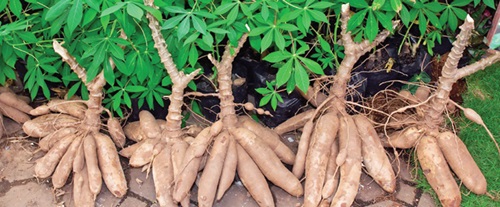
Cassava — Ghana’s next gold mine
In an effort to elevate Ghana's cassava industry onto the global stage, the Executive Director of Agrihouse Foundation, Alberta Nana Akyaa Akosa, rallies actors in the cassava industry to take advantage of development in the sector.
Delivering a compelling address to a global audience at the recently concluded International Cassava Fair in Brazil, she advocated a transformative approach to Ghana's cassava industry, emphasising the critical need to reshape the narrative around cassava cultivation in the country and the necessity for value addition.
Addressing the topic :"Securing Ghana’s Future Through Cassava" at the International Cassava Fair (FIMAN 2023) in Brazil, monitored in Ghana, Ms Akosa shed light on the unique opportunities and challenges facing Ghana's cassava industry, exploring avenues for collaboration with international partners, adoption of best practices, value addition, mechanisation, and innovative strategies.
The goal is to position Ghana as a major player in the global cassava market.
The FIMAN 2023, organised by Podium Alimentos, was held from Tuesday, November 21 to Thursday, November 23, 2023, to foster knowledge exchange, networking, and collaborative exploration in the cassava sector.
Ms Akosa highlighted the crucial role of Ghana-Brazil collaboration in propelling advancements within Ghana’s cassava industry to significantly contribute to food security and economic growth in the country.
Celebrating cassava
Despite its immense potential, Ms Akosa highlighted the startling reality that Ghana was not celebrating cassava enough.
She expressed concern that the majority of cassava farming was directed towards domestic consumption, with limited emphasis on value addition.
“While there are noteworthy industries engaged in starch and alcohol production, the broader cassava sector struggles to secure the attention it deserves, particularly in comparison to the historically dominant cocoa and gold industry.
"Despite the abundance of opportunities in our cassava value chain, it remains underrated and under-celebrated.
We all know how easy it is to grow cassava here in Ghana.
![]()
Alberta Nana Akyaa Akosa, Executive Director of Agrihouse Foundation, making a presentation at the International Cassava Fair in Brazil
Our country, our youth, our women, and the industry as a whole stand to gain more if we fully explore and embrace the vast potential within the cassava value chain, it is time for Ghana to mine Cassava as it mines Gold,” she told the international gathering.
She courted the international community to consider Ghana as their destination to take advantage in the cassava sector saying, “Our country needs more cassava factories, farms, varieties, and equipment such as planters, harvesters, dryers, and washers’’.
Hidden riches
Ms Akosa stressed the need for a paradigm shift in Ghana's agricultural focus, calling for a redirection of attention and energy to cassava, which had often been relegated to the level of subsistence farming.
She said her call for a paradigm shift extended beyond the agricultural landscape, saying that it beckoned a recalibration of societal perceptions and urged Ghanaians to recognise the economic and nutritional potential that cassava held.
“The abundance of this resilient crop represents an untapped resource that, with the right attention, could blossom into a driving force for economic growth and food security.
“With a production capacity that rivals cocoa, the time is ripe for Ghana to seize the opportunity and usher in a new era of cassava appreciation,” she said.
While notable industries engage in starch and alcohol production, she said there remained immense scope for diversification, insisting that the versatility of cassava extended far beyond the traditional, offering a canvas for innovative products and industries.
Ms Akosa said encouraging value addition did not only benefit local farmers, but also positioned Ghana on the global stage as a key player in the cassava market.
Challenges
The executive director identified traditional farming methods, which was predominantly through the use of cutlasses and hoes, remained prevalent and one of the major challenges facing the cassava sector.
She, however, noted a positive trend with an increasing number of women small-holder farmers contributing to the sector, adding that the existence of 32 cassava varieties developed by research institutions reflected the genetic diversity available for exploration.
Ms Akosa also identified the lack of machinery and equipment for processing, drying, and planting as another bottleneck that hindered efficiency.
She said the knowledge gap for value addition and the absence of diverse recipes to encourage farmers to explore alternative uses of cassava contributed to the stagnation of the sector.
Proposed measures
Laying a comprehensive set of proposals to propel the cassava sector forward, Ms Akosa said, among other things, the was the need for urgent development and availability of domestic and edible seed varieties, the infusion of machinery and equipment at every stage of the production process, and a robust effort to address the knowledge gap hindering value addition.
She underscored the call for capacity building and know-how to commercialise cassava effectively, along with increased investment in inputs and technology.
Ms Akosa called for partnerships for industrialisation and commercialisation, positioning cassava as the next economic powerhouse akin to cocoa and gold.
The initiative, she emphasised, would not only create more employment opportunities but also generate the much-needed revenue.
